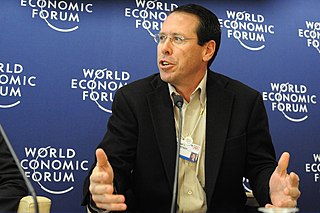A Quote by Stephen Elop
I have to experience the Nokia products. I'm a major contributor to the design and the quality of the devices. I have a lot of feedback to provide the teams on that. But also I have to carry competitive devices. You have to understand the competition.
Quote Topics
Related Quotes
I believe there's plenty of market for each; we're talking about an ecosystem that is going to support billions of devices, so a competitive landscape is good for consumers, developers, and the platforms alike. Apple brings a smooth elegance to its devices and platform, with the best marketplace experience to boot. Google brings a higher volume of devices as well as a more diverse ecosystem to interact with. The real story here is that Microsoft is nowhere to be seen, ending a two-decade monopoly and creating biggest opportunity for software startups probably ever.
Our first-party devices will light up digital work and life. Surface Pro 3 is a great example -- it is the world's best productivity tablet. In addition, we will build first-party hardware to stimulate more demand for the entire Windows ecosystem. That means at times we'll develop new categories like we did with Surface. It also means we will responsibly make the market for Windows Phone, which is our goal with the Nokia devices and services acquisition.
If you look at the economics of Nokia roughly half of the company, half of the business, half of how we think about the business is focused on those emerging markets and on those lower-priced devices. But, of course, people who are aspirational and buying those lower-priced devices today are looking at smart phones tomorrow, and so forth.
If you look at the economics of Nokia, roughly half of the company, half of the business, half of how we think about the business is focused on those emerging markets and on those lower-priced devices. But, of course, people who are aspirational and buying those lower-priced devices today are looking at smart phones tomorrow, and so forth.
It used to be that if your automobile broke, the teenager down the street with the wrench could fix it. Now you have to have sophisticated equipment that can deal with microchips. We're entering a world in which the complexity of the devices and the system of interconnecting devices is beyond our capability to easily understand.
Humans are incapable of securely storing high-quality cryptographic keys, and they have unacceptable speed and accuracy when performing cryptographic operations. (They are also large, expensive to maintain, difficult to manage, and they pollute the environment. It is astonishing that these devices continue to be manufactured and deployed. But they are sufficiently pervasive that we must design our protocols around their limitations.)
In the digital world, content has the tendency to lose value, especially on smart devices. We finally found solutions to the problem. We will not merely port games developed for our dedicated systems to smart devices just as they are - we will develop brand new software which perfectly matches the play style and control mechanisms of smart devices.































